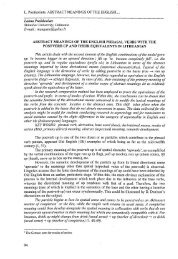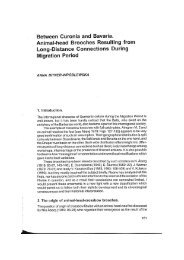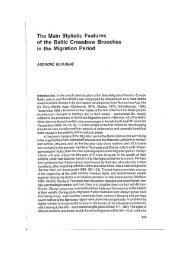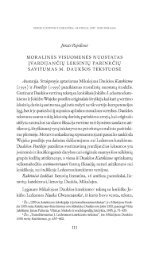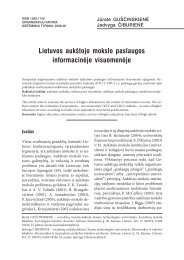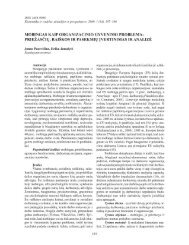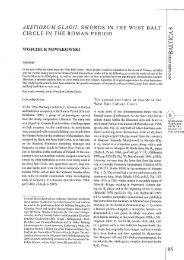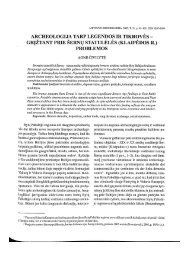ECO-MARKETING AND ECO-LABELLING: DOES IT ENSURE ...
ECO-MARKETING AND ECO-LABELLING: DOES IT ENSURE ...
ECO-MARKETING AND ECO-LABELLING: DOES IT ENSURE ...
Create successful ePaper yourself
Turn your PDF publications into a flip-book with our unique Google optimized e-Paper software.
D.Grundey 155 ISSN 1648-4460<br />
Source: IBEB 2000.<br />
Besearchmg Customer Loyalty ¡n Lithuania<br />
• ecodesign<br />
• ecolabel<br />
• consumer information<br />
green mariiet research<br />
Germany Switzerland UK Hungary countries<br />
Figure 1. Product-related activities and innovations in business economics<br />
Therefore, environment-friendly products/processes should be offered in the market.<br />
Technology, being a market product, is also responsible for the present condition of<br />
the natural environment. One can find numerous examples showing both negative and<br />
positive influence of (new) technology on the environment. On the one hand, the present<br />
state of pollution is partly a result of technological innovations introduced in the past<br />
decades. On the other hand, new technology is a tool for the environment protection and<br />
rescue, i.e., a liquidation of damages caused by the past technologies. Therefore,<br />
environment-friendly products/processes should be offered in the market {Figure 1). These<br />
two kinds of the impact will be developed below.<br />
1.2. Ecological Marketing<br />
A classical marketing, being an integrated set of four instruments (4Ps), is a<br />
managerial process in which a firm is an object influencing the market (Kotler, 2001). In<br />
other words, wc may treat marketing as a system of management of the market. An<br />
enterprise is, at the same time, the market participant. Now we should consider the firm as an<br />
element of the environment. This time, the natural enviroimient becomes a cmcial<br />
component of the firm's marketing surroundings.<br />
So, modem marketing must be environment-oriented. It should be understood as an<br />
clement of a system of the environment management.<br />
Such a marketing has received various names: new marketing, ecological marketing,<br />
eco-marketing and even green marketing (McDanicl & Rylandcr, 1993). However, a name is<br />
here minor; the essence is important. A concept of environment-friendly marketing fulfils the<br />
criteria of a Kotlcr's model of societal marketing.<br />
The societal marketing concept holds that the organization's task is to determine the<br />
needs, wants, and interests of target markets and to deliver the desired satisfactions more<br />
effectively and efficiently than competitors in a way that preserves or enhances the<br />
consumer's and the society's well-being. The concept calls upon marketers to balance three<br />
considerations in setting their marketing policies, namely, company profits, consumers want<br />
satisfaction, and public inlcrcst (Kotler, 2001, p.26). Nowadays, a state of the environment is<br />
obviously of public inlcrcst and has a big influence on the society's well-being.<br />
Caslcnow in his "New Marketing" describes a global Ircnd named: the natural<br />
environment, and its consequences for a future marketing (Caslcnow, 1993).<br />
ni-tNSIXmi.-niONSIN nUMNIlSS c~P.COSOMICS, Vol 8, No 1 (16), 2009



